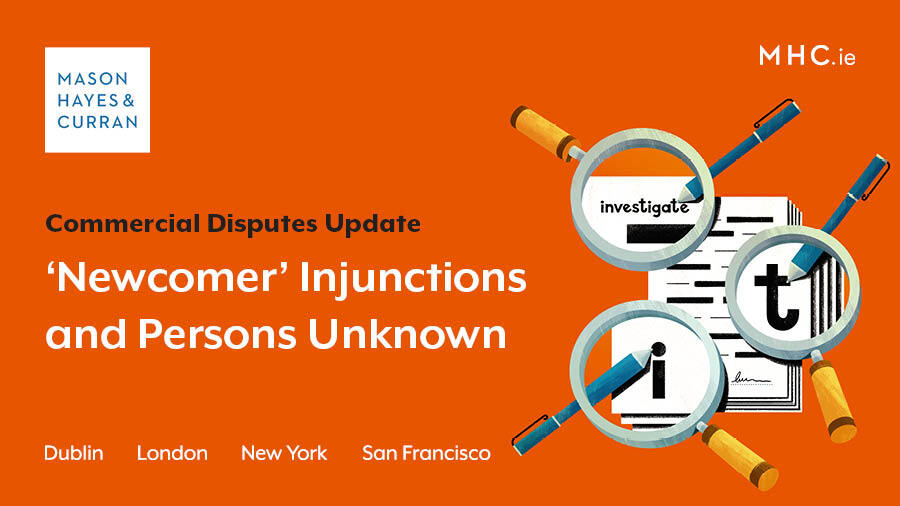
The Irish Supreme Court has confirmed that Irish courts have the power to grant injunctions against persons unknown. However, it emphasised that these instances are exceptional and should only be exercised in cases where it is truly warranted. The UK Supreme Court subsequently confirmed the basis on which the courts of England and Wales may grant what are known as ‘newcomer’ injunctions against persons unknown. Commercial Disputes partners Gearoid Carey and Gerard Kelly examine that decision and consider it in the context of the current state of Irish law.
In Irish law, the term "persons unknown" is often used in the context of court orders or legal proceedings. When a plaintiff is seeking an injunction or some other form of relief but the identity of the potential defendant(s) is unknown or cannot be specifically identified, the court may grant an order against "persons unknown." This allows the order to apply to individuals who may be involved in certain activities, even if their identities are not known at the time the order is sought or made.
The power of the Irish courts to grant injunctions against persons unknown has been confirmed relatively recently by the Irish Supreme Court.[1] In confirming that these orders may be made arising from the ‘inherent jurisdiction’ of the court, it recognised that orders against unnamed persons are exceptional and should only be awarded where truly warranted. It stated that “the administration of justice should not be placed at the mercy of those who would resort to anonymity and evasion as a ploy to hand trip the efforts of plaintiffs”.
However, it confirmed that once the identities of the unknown persons become known, the title of proceedings should be amended to identify them.
The UK Supreme Court has more recently confirmed the jurisdiction of the courts of England and Wales to grant what are known as ‘newcomer’ injunctions, subject to certain safeguards.[2]
A key feature of a newcomer injunction is that it applies to persons who are not just unknown, but also those who have not breached, or even threatened to breach, the obligation or right at the centre of the proceedings. The UK Supreme Court recognised this power as equitable in nature and, by reference to several other features, concluded that there was “no doubt that the injunction against newcomers is a wholly new type of injunction with no very closely related ancestor.” Although the case concerned the potential trespass and damage to real property, the UK Supreme Court was unequivocal that the issues raised were novel and had wider significance. This included the context of IP rights, regarding which it noted that injunctions against "unknown persons" are nothing new.
Background
Between 2015 and 2020, local authorities had obtained injunctions aimed at preventing gypsies and travellers from occupying local authority lands without permission. These orders, obtained before and without the threat to commit any unlawful act, were addressed to ‘persons unknown’ because the relevant individuals could not generally be identified in advance. By their nature, the orders also covered any newcomers to the group affected, hence the description/name applied. From 2020, local authorities applied to extend and/or vary injunctions coming to an end. However, the High Court decided there was a need to review all ‘newcomer’ injunctions affecting gypsies and travellers. The group was given permission to intervene so their interests could be represented. The question as to the jurisdiction to make these orders, and the conditions on which they might be made, ultimately came before the UK Supreme Court.
Decision
At the outset, it was recognised that the jurisdiction to make these orders was not statute based. Unless the legislature intervened, injunctions (like these orders) were not limited to pre-existing and established categories. Rather, the courts had flexibility and injunctions could be granted in new circumstances as and when necessitated by the principles of justice and equity.
Judge-made law had an important role in remediating defects or inadequacies in legal protections - where there is a right, there should be a remedy to protect that right. In addition, newly recognised protections should respond to changes in circumstances over time. Taking those principles into account, the UK Supreme Court concluded that there was no reason in principle why ‘newcomer injunctions’ should not be granted as they represented a valuable and proportionate remedy in appropriate cases. However, this does not mean they should be granted in every case. Therefore, in deciding whether to grant a ‘newcomer injunction’, a court should have regard to the above principles.
Additionally, even if it is considered appropriate in principle to grant one, the UK Supreme Court stressed the need for safeguards to be put in place which, like the principles applicable to the awarding of newcomer injunctions, will evolve over time, based on experience. The safeguards recognised included:
- There must be a compelling need to protect civil rights or enforce public law not adequately met by other remedies
- The application should be advertised widely so that those likely to be affected by it or bodies representing them have an opportunity to make submissions prior to the making of the order
- The applicant is required to disclose to the court, after due research, any matter which a newcomer might raise in opposition to the making of the order
- Once granted, a copy must be displayed in a prominent location at the affected site. Newcomers should be clearly notified of the right to apply to have it varied or set aside
- These injunctions should be limited and not apply for a disproportionately long time or apply to a disproportionately wide geographic area
- The court must be satisfied that on the facts of the case it is just and convenient to grant a newcomer injunction
Conclusion
The decision of the UK Supreme Court confirms the ability to grant ‘newcomer injunctions’ in England and Wales, albeit on a seemingly more restrictive basis than previously applied. These orders have been made in the UK for some time, although on a slightly different basis, but the jurisdiction for making these orders has not yet been recognised here. It is uncertain whether the courts in Ireland would be prepared to grant these kinds of injunctions. In Irish law, when it comes to making orders or injunctions against unidentified persons unknown, the process is generally exceptional. Aligning the broader impact of ‘newcomer injunctions’ with the Irish legal obligation to name unknown individuals as soon as they are identified in legal proceedings may be very difficult, if not impossible. However, if they are to be recognised in Irish law, it would give property owners (both physical and intellectual) an additional means to safeguard their interests.
For more information and expert advice on commercial disputes, contact a member of our Commercial Disputes team.
The content of this article is provided for information purposes only and does not constitute legal or other advice.
[1] Pepper Finance Corporation (Ireland) DAC v Persons Unknown in Occupation of the Property known as 21 Little Mary Street, Dublin 7 and Pepper Finance Corporation (Ireland) DAC v Persons Unknown in Occupation of the Property known as 31 Richmond Avenue, Dublin 3 [2023] IESC 21. This was considered in our previous article on the topic
[2] Wolverhampton City Council & Ors v London Gypsies and Travellers & Ors [2023] UKSC 47





